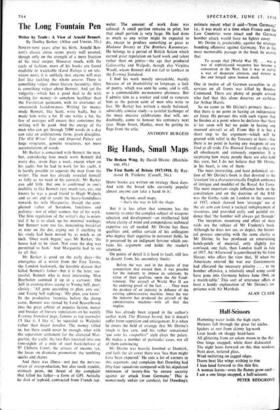The Long Fountain Pen
NINETY-NINE years after his birth. Arnold Ben- nett's classic sfatus seems pretty well assured, though only on the strength of a mere fraction of his total output. However much, with the cycle of fashion, more of his books are found readable or watchable (Lord Raingo is on tele- vision now), it is unlikely that anyone will ever feel like tackling the whole oeuvre. There is something vulgar about literary fecundity; tIkre is something vulgar about Bennett. And yet the vulgarity—which has a good deal to do with writing for money—is somehow healthier than the Forsterian quincunx, with its overtones of amateurish fastidiousness. Writing for money made Bennett, like Scott, write badly, but it made him write a lot. If one writes a lot, the law of averages will ensure that sometimes the writing will be good. And the energy of the man who can get through 7,000 words in a day can take an architectonic form, given discipline. The Old Wives' Tale and Imperial Palace are huge structures, genuine structures, not mere accumulations of words.
Mr Barker is concerned with Bennett the man, but, considering how much work Bennett did every day, seven days a week, except when on his yacht, but he had to work for his yacht, it is hardly possible to separate the man from the writer. The man has already revealed himself as fully as we need in his journals; Mr Barker can add little. But one is confirmed in one's inability to like Bennett very much (yes, yes, one knows he was a good friend to Hugh Walpole and so on) and to resent the heavy-handedness towards his wife Marguerite, though she com- plained rather of boredom, loneliness and jealousy—not of other women, but of his work. The firm regulation of the writer's day is, essen- tial if he is to clock up his minimal wordage, but Bennett went too far, demanding breakfast at nine on the dot, crying out if anything in his study had been moved by as much as an inch. 'Once work began,' says Mr Barker, 'the house had to be silent. Not even the dog was permitted to bark.' And Marguerite had to see to all that.
Mr Barker is good on the early days—the emergence of a writer from the Five Towns, the London hackwork, the horrible disease that killed Bennett's father—but it is the later, suc- cessful, Bennett who is most interesting. Max Beerbohm summed it up in a cartoon: Old Self in evening-dress saying to Young Self, poor, clerkly : 'All gone according to plan, you see,' and Young Self replying: `My plan, you know.' In the productive 'twenties, before the slump came, Bennett was turned by lord Beaverbrook into the great arbiter of popular fiction, maker and breaker of literary reputations on his weekly Evening Standard page, famous as top journalist CI like it, I like it,' he squealed to Walpole) rather than major novelist. The money rolled in, but there could never be enough, what with the separation settlement for the alienated Mar- guerite, the yacht, the two flats knocked into one (one-eighth of a mile of steel bookshelves) at 97 Chiltern Court, the arrears of income tax, the losses on dramatic promotion, the tumbling stocks and shares.
And there was illness—not just the nervous strain of overproduction, but also tooth trouble, stomach pains, the threat of the complaint that killed his father—a form of GPI. Actually he died of typhoid, contracted from French tap- water. - The amount of work done was colossal. A small portion remains in print, but that small portion is very large. He had done as much as any writer might be expected to do, except to produce something as great as Madame Bovary or The Brothers Karamazov. He belongs to a'period of British fiction which earned great reputation on hard work and talent rather than _on genius—the age that produced Galsworthy and Walpole, though also Virginia Woolf, whom Bennett did not fail to lambast in the Evening Standard.
I find his work mostly unreadable, mainly because of an insensitivity to language, a lack of poetry, which was seen by some, and is still, as a commendable no-nonsense plainness. But I admire him as a worker and tend to venerate him as the patron saint of men who write to live. Mr Barker has written a nicely balanced, admirably concise study—a tasteful harbinger of the more massive celebrations that will, un- doubtedly, come to honour his centenary next year. Hope Street, Hanley, must be getting its flags from the attic.
ANTHONY BURGESS






























 Previous page
Previous page